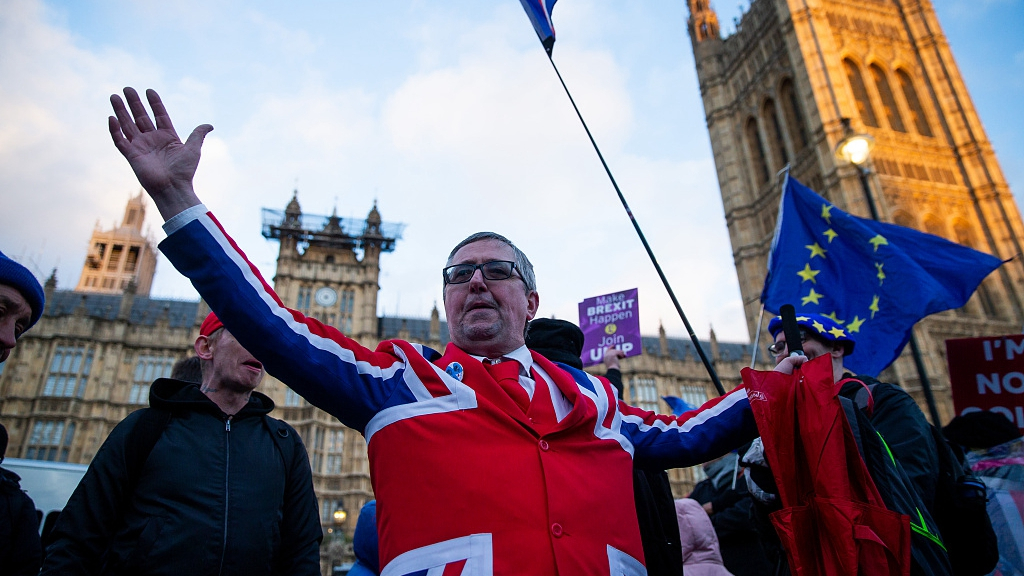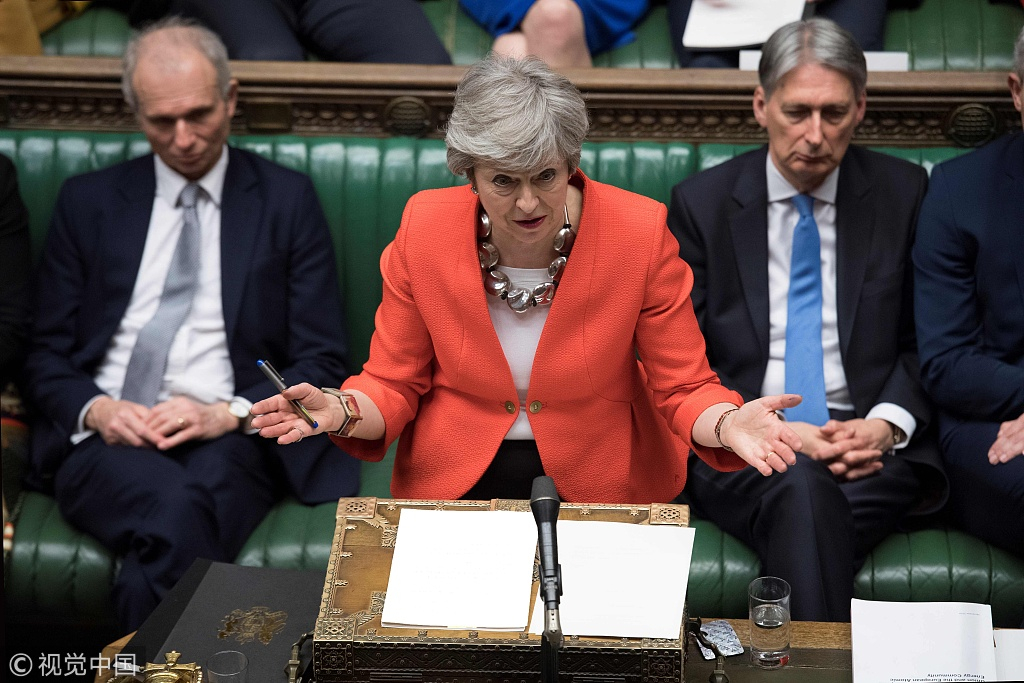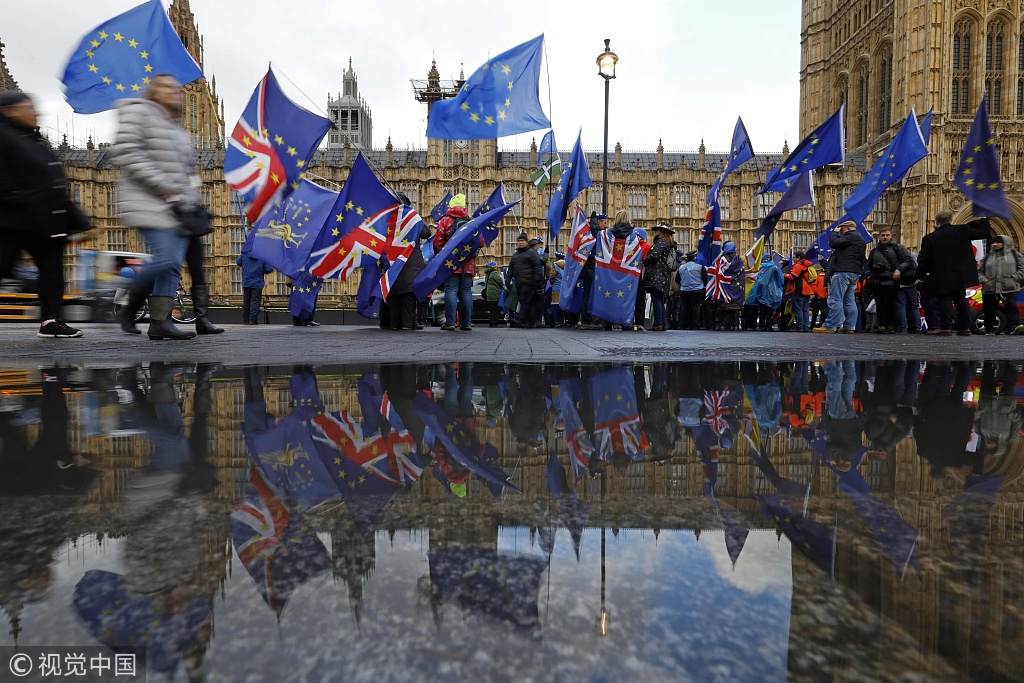
Opinion
18:01, 13-Mar-2019
The end of Brexit
Updated
21:31, 14-Mar-2019
Tom Fowdy

Editor's note: Tom Fowdy, who graduated from Oxford University's China Studies Program and majored in politics at the Durham University, writes about international relations focusing on China and the Democratic People's Republic of Korea. The article reflects the author's views, and not necessarily those of CGTN.
Tuesday night saw the British Prime Minister's revived effort in passing her deal through parliament quashed again. Placed to the vote, Theresa May's modified Brexit deal was defeated by 391 votes to 242.
The second major defeat that her proposals with Brussels have suffered at the hands of the House of Commons, it is fair to say that the Brexit she negotiated is dead. There is no way back for it. But of course, it need not be asked anymore, just what now?
With the deadline for Article 50 looming ahead in just over two weeks' time, decisive action is needed to determine the UK's political future. It hangs on two votes, those being the pending vote on whether to block a no-deal outcome, and then the follow-up vote should it succeed, in extending Article 50 or not.
I personally believe that this constitutes the de-facto end of Brexit, for a consensus will never emerge amongst MPs on a set of terms as to which Britain should leave Europe, if for that matter at all.
With a majority in the commons opposed to Brexit, both votes will pass by strong margins and Article 50 will ultimately be extended. From here, there will be no more political space available for the government to push forward.
Instead, they will cave into either another general election or for that matter, another referendum completely. In any scenario, the odds for Britain's departure to somehow recuperate itself are slim.

Britain's Prime Minister Theresa May speaks at the start of the debate on the second meaningful vote on the government's Brexit deal, in the House of Commons in London, March 12, 2019. /VCG Photo
Britain's Prime Minister Theresa May speaks at the start of the debate on the second meaningful vote on the government's Brexit deal, in the House of Commons in London, March 12, 2019. /VCG Photo
Theresa May's deal is irredeemable, yet it has politically cornered her. European leaders have been strict in setting out that such is the best they could offer Britain, unwilling to offer her any other concessions. Seemingly, Brussels underestimated the reaction it would receive domestically.
Owing to the controversial element of the “Northern Irish backstop” and its membership of the customs union, many of the most ardent Conservative eurosceptics, as well as the allied democratic unionist party, refused to support it, seeing it as a severing of the United Kingdom into two customs unions and a risk it could end up bound to Brussels with no unilateral right of cancellation.
May's attempt to clarify this in renegotiations did not buy any additional confidence. Thus not once, but twice, her deal was voted down by the commons, with 75 of her own MPs joining the rebellion. The only serious deal Brussels was willing to offer Britain, is thus dead.
Such a rejection means that with the UK's departure scheduled for the 29th, a default no-deal looms. The Conservative rebels who assisted in voting down the deal have repeatedly advocated this option to force Brussels' hand.
However, most analysts and research indicates the economic damage it would cause would be catastrophic. As a result, a parliamentary vote has been scheduled as to whether a no-deal outcome should be blocked or not. The government has not taken a position and instead offered a free vote.
Luckily, the vote is likely to pass in blocking it. Most of the members of parliament are opposed to a no-deal Brexit, in contrast to only a small minority of Conservative hardliners who support it. Thus, the worst is likely to be prevented.
After this will come an inevitable vote as to whether Article 50 should be extended or not, which by logic will also pass if its predecessor does. This would push back Britain's departure time to around December. But after this, what next?

Anti-Brexit supporters wave flags as they demonstrate outside the Houses of Parliament in London, March 12, 2019, /VCG Photo
Anti-Brexit supporters wave flags as they demonstrate outside the Houses of Parliament in London, March 12, 2019, /VCG Photo
The European Union is not going to change its offer or present additional concessions, which means the political pendulum now begins to swing against Brexit in its entirety. Pushed against the wall, the Conservative government now has to change the status quo or concede something big to bridge the impasse.
There are a number of pathways here and nothing can be predicted. They could call another general election and attempt to force a majority in favor of Brexit or they could capitulate to putting it a second referendum. The former seems more likely than the latter, but even if so, what chance do they have of success, especially when people are past taking positive sentiment of Brexit seriously?
Given this, Brexit has now more political obstacles to climb over than ever before. Issues with May's deal and the party layout of the commons simply cannot produce Brexit as it stands. Unless something big changes, the Article 50 extension can only be a state of limbo at best, it cannot be an end or a solution in and of itself.
Yet, it is now not possible for someone to depict what or how Brexit should be, not even the Conservatives between themselves can conjure that up. Their own division and bitter contentions have ensured the destruction of the only route which was offered, thus opening the floor to others.
As a result, those strongly seeking to remain have the opportunity to seize the initiative. With public opinion increasingly disillusioned and unenthusiastic for Brexit, it would take a spectacular fightback of miraculous proportions, far against the odds and against the tide itself, for the Conservatives to somehow regroup and snatch victory from the jaws of defeat. Make no question about it, if that cannot be achieved then it is so coldly, the end of Brexit.
(If you want to contribute and have specific expertise, please contact us at opinions@cgtn.com.)

SITEMAP
Copyright © 2018 CGTN. Beijing ICP prepared NO.16065310-3
Copyright © 2018 CGTN. Beijing ICP prepared NO.16065310-3